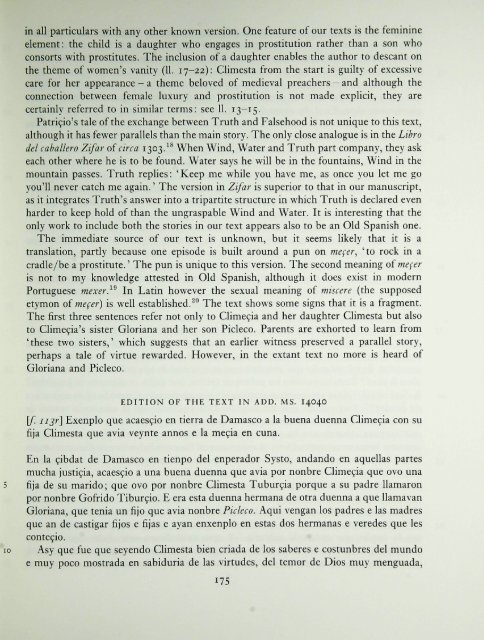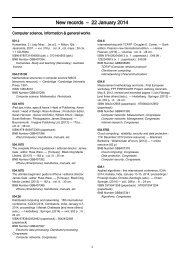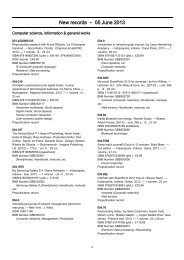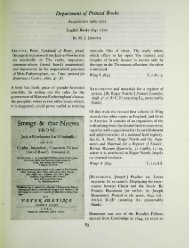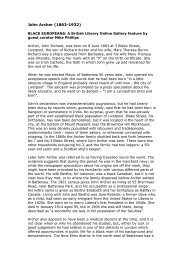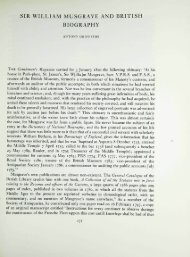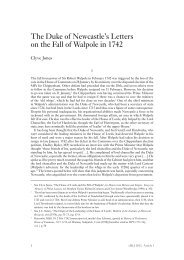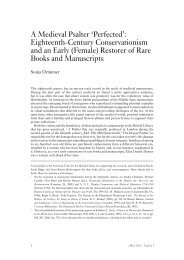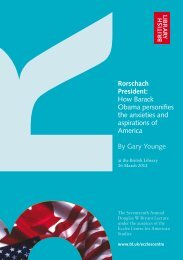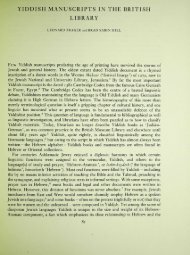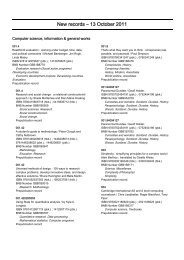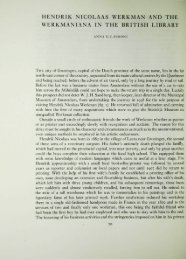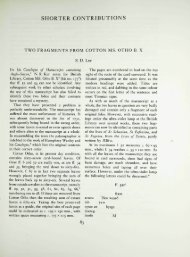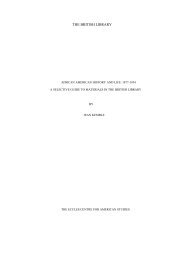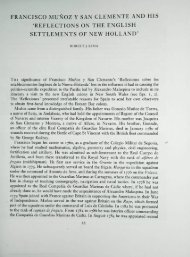AN OLD SPANISH TALE FROM ADD. MS. 14040, flf ... - British Library
AN OLD SPANISH TALE FROM ADD. MS. 14040, flf ... - British Library
AN OLD SPANISH TALE FROM ADD. MS. 14040, flf ... - British Library
Create successful ePaper yourself
Turn your PDF publications into a flip-book with our unique Google optimized e-Paper software.
in all particulars with any other known version. One feature of our texts is the feminine<br />
element: the child is a daughter who engages in prostitution rather than a son who<br />
consorts with prostitutes. The inclusion of a daughter enables the author to descant on<br />
the theme of women's vanity (11. 17-22): Chmesta from the start is guilty of excessive<br />
care for her appearance - a theme beloved of medieval preachers - and although the<br />
connection between female luxury and prostitution is not made explicit, they are<br />
certainly referred to in similar terms: see 11. 13-15.<br />
Patrigio's tale ofthe exchange between Truth and Falsehood is not unique to this text,<br />
although it has fewer parallels than the main story. The only close analogue is in the Libra<br />
del caballero Zifar of circa 1303.^^ When Wind, Water and Truth part company, they ask<br />
each other where he is to be found. Water says he will be in the fountains. Wind in the<br />
mountain passes. Truth replies: 'Keep me while you have me, as once you let me go<br />
you'll never catch me again.' The version in Zifar is superior to that in our manuscript,<br />
as it integrates Truth's answer into a tripartite structure in which Truth is declared even<br />
harder to keep hold of than the ungraspable Wind and Water. It is interesting that the<br />
only work to include both the stories in our text appears also to be an Old Spanish one.<br />
The immediate source of our text is unknown, but it seems likely that it is a<br />
translation, partly because one episode is built around a pun on mefer, 'to rock in a<br />
cradle/be a prostitute.' The pun is unique to this version. The second meaning of mefer<br />
is not to my knowledge attested in Old Spanish, although it does exist in modern<br />
Portuguese mexer}^ In Latin however the sexual meaning of miscere (the supposed<br />
etymon of mefer) is well established.^*' The text shows some signs that it is a fragment.<br />
The first three sentences refer not only to Climegia and her daughter Climesta but also<br />
to Clime^ia's sister Gloriana and her son Picleco. Parents are exhorted to learn from<br />
'these two sisters,' which suggests that an earher witness preserved a parallel story,<br />
perhaps a tale of virtue rewarded. However, in the extant text no more is heard of<br />
Gloriana and Picleco.<br />
EDITION OF THE TEXT IN <strong>ADD</strong>. <strong>MS</strong>. <strong>14040</strong><br />
[f. ii3r] Exenplo que acaes^io en tierra de Damasco a la buena duenna Climefia con su<br />
fija Climesta que avia veynte annos e la megia en cuna.<br />
En la ^ibdat de Damasco en tienpo del enperador Systo, andando en aquellas partes<br />
mucha justi^ia, acaes^io a una buena duenna que avia por nonbre Climefia que ovo una<br />
fija de su marido; que ovo por nonbre Climesta Tuburgia porque a su padre llamaron<br />
por nonbre Gofrido Tiburgio. E era esta duenna hermana de otra duenna a que llamavan<br />
Gloriana, que tenia un fijo que avia nonbre Picleco. Aqui vengan los padres e las niadres<br />
que an de castigar fijos e fijas e ayan enxenplo en estas dos hermanas e veredes que les<br />
Asy que fue que seyendo Climesta bien criada de los saberes e costunbres del mundo<br />
e muy poco mostrada en sabiduria de las virtudes, del temor de Dios muy menguada,<br />
175


